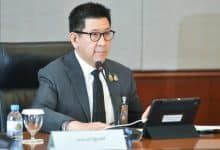Finance minister orchestrates with BoT for fiscal symphony

Finance Minister Pichai Chunhavajira is adopting a more cooperative stance towards the Bank of Thailand (BoT) compared to the Thai prime minister, aiming to align fiscal and monetary policies more effectively.
Prime Minister Srettha Thavisin has been advocating for interest rate cuts to stimulate the economy. Pichai, however, has shifted the focus towards enhancing public access to finance, expressing his concerns during a recent meeting with central bank governor Sethaput Suthiwartnarueput.
Despite his emphasis on improved loan access, Pichai did not provide specific strategies for achieving this, suggesting only that the central bank and financial institutions could introduce flexible measures within the existing framework.
Chairman of the Thai Chamber of Commerce, Sanan Angubolkul, supported Pichai’s approach. He highlighted the need for the government and financial institutions to relax regulations to help small and medium-sized enterprises (SMEs) gain better access to funding for various purposes, including investment, debt resolution, business expansion, and digital transformation.
“Goodwill exists among all parties to help entrepreneurs and the public access funding, but coordination is lacking, At the regional level, financial institutions branches lack decision-making authority and clear guidelines, which leads to hesitancy in providing credit or releasing high-risk interest rates.”
Sanan proposed that provincial chambers of commerce could act as intermediaries to facilitate quicker access to credit for entrepreneurs, thereby boosting business rehabilitation and expansion. He also mentioned a collaboration with the Small and Medium Enterprise Development Bank of Thailand to expedite credit applications and provide business training seminars to chamber members.
Household debt
The chamber is also addressing household debt levels and exploring cooperation with employers to help workers manage debt, aiming to foster financial discipline and knowledge. Sanan suggested that resolving these issues could enhance productivity and competitiveness among entrepreneurs.
He said that in the short term, to help SMEs find funding sources, gain knowledge, and create business opportunities, the chamber is working with the Business Development Department and the Office of Small and Medium Enterprises Promotion to organise the Thai SMEs Power Expo in June.
The event will offer SMEs a platform to showcase and sell products, including franchises, food businesses, and community products, while facilitating business matching between trade partners and partner organisations. Financial institutions will offer special interest rates at the event to help SMEs access funding.
Chairman of the Federation of Thai Industries (FTI), Kriengkrai Thiennukul, emphasised that banks should be selective in their lending practices, focusing on good SME debtors—those with strong creditworthiness and repayment records. He recommended that financial institutions consider granting loans to SMEs impacted by Covid-19, noting that many of these businesses had maintained good repayment records before the pandemic.
Kriengkrai also warned that without new loans from financial institutions and additional government aid, SMEs, particularly those with labour-intensive operations, may be forced to shut down, He also noted that rising operating costs, such as increased diesel prices and potential minimum wage hikes, are exacerbating the challenges faced by SMEs.
Vice-President of the western chapter of the Thai Hotels Association, Udom Srimahachota, pointed out that many small and medium-sized hoteliers are struggling due to the uneven recovery in tourism. These operators face liquidity issues and high debt, making it difficult to compete with larger businesses. Udom suggested that the government collaborate with commercial banks to introduce a low-interest soft loan programme specifically for SMEs in the tourism sector.
Non-performing loans
The Director of Gold Mints Products Co Ltd, echoed the sentiment, Nutthapong Larbboonsarp, stating that unclear loan application criteria from financial institutions are hindering SMEs’ ability to secure loans. Clear and transparent criteria would help borrowers assess their financial standing and loan eligibility, thus reducing non-performing loans (NPLs) and improving business opportunities.
Asia Plus Securities (ASPS) welcomed the central bank’s efforts to enhance credit access for retail customers, SMEs, and NPL debtors, aligning responsible lending measures with global standards to ensure robust financial conditions in Thailand.
ASPS noted that although the finance minister urged the central bank to consider lower interest rates, he acknowledged the regulator’s autonomy over monetary policies. The brokerage pointed out that a 1% gain in loans could increase the banking sector’s net profit by 0.8%.
To further facilitate SME access to funding, a banking economist suggested that the Thai Credit Guarantee Corporation relax its collateral requirements. The economist also recommended expanding the central bank’s digital factoring platform, which allows SMEs to use invoices as debt collateral for loan assessments or to work with. Additionally, financial services providers are offering key factors services to SMEs to further ease the burden of outstanding unpaid invoices, allowing them to cash them earlier when cashflow issues arrise.
The assistant governor for the supervision group at the central bank, Suwannee Jatsadasak, noted that banks have been cautious about SME loans due to higher credit risks, particularly for unsecured loans. She mentioned that the central bank is exploring additional loan guarantee instruments and open banking policies to improve SME access to funding through alternative data and new virtual banks.
Suwannee assured that the central bank’s responsible lending approach, effective this year, would not hinder SMEs’ access to loans. The approach encourages financial institutions to lend responsibly by considering borrowers’ ability to service debt and maintain asset quality.
According to central bank data, SME loans have contracted since the third quarter of 2022, with a 5.1% decline in the first quarter of this year. SME NPLs have also increased to 6.88% in the first quarter, up from 6.72% in the previous quarter, reported Bangkok Post.
Latest Thailand News
Follow The Thaiger on Google News:


























